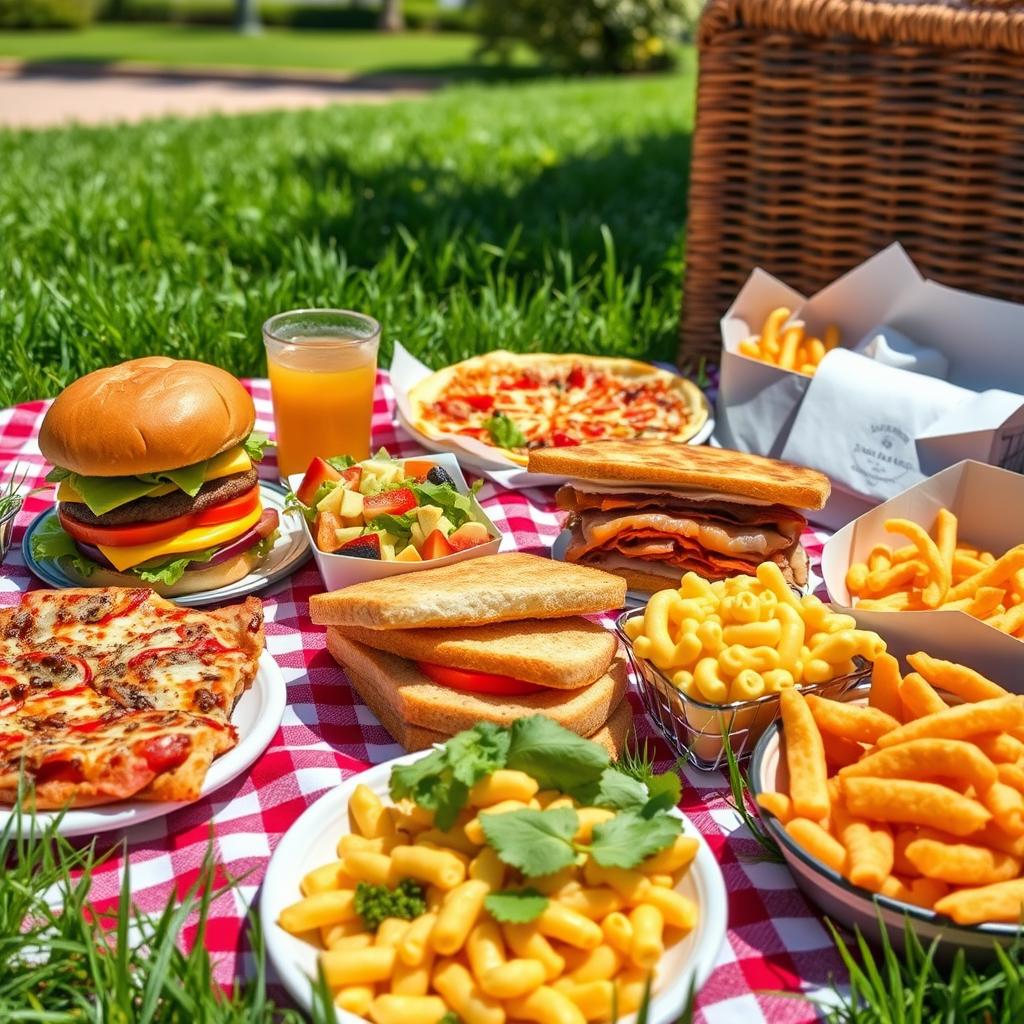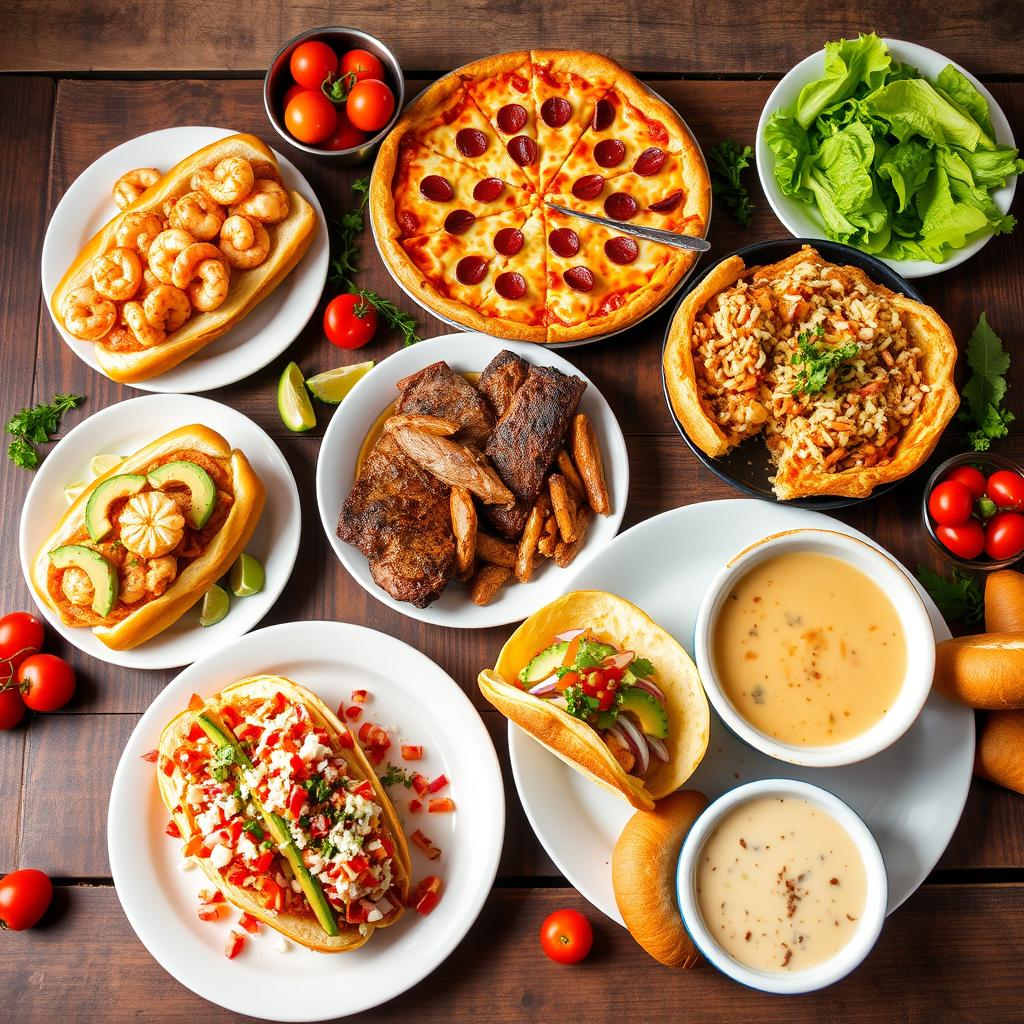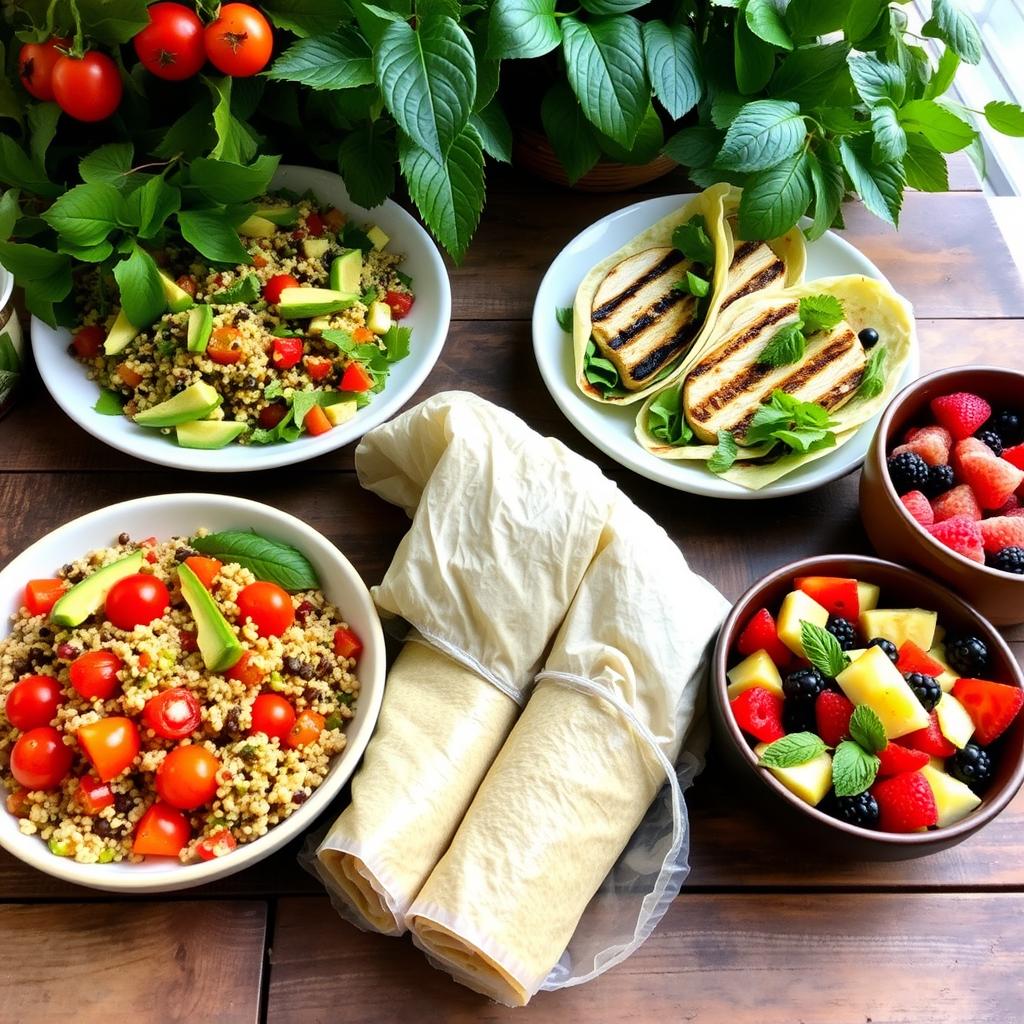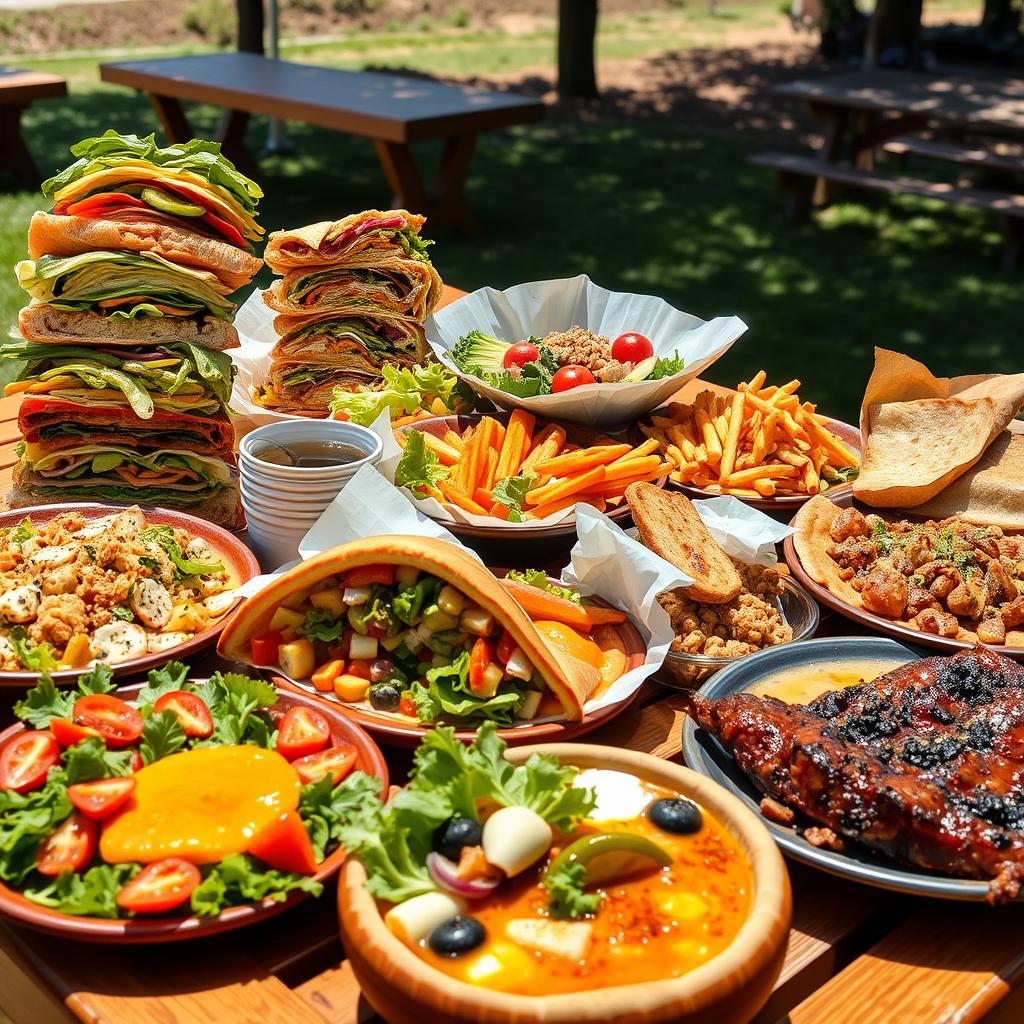Reading time: 10 minutes
As the smell of burgers and fries fills the air, you might get hungry. Lunch in America is a mix of different tastes, traditions, and cultures. It shows the country’s diverse heritage.
From the classic peanut butter and jelly sandwich to the Philly cheesesteak, American lunch is exciting. It’s a journey through flavors and traditions.
Table of contents
- The Evolution of American Lunch Culture
- What Do Americans Eat for Lunch?
- Popular Sandwiches and Wraps in American Lunch Culture
- Fast Food and Quick-Service Restaurant Lunches
- Regional Lunch Specialties Across America
- Workplace and School Lunch Traditions
- Healthy and Contemporary Lunch Options
- Time and Social Aspects of American Lunches
- Conclusion
- FAQs
The Evolution of American Lunch Culture
American lunch culture has changed a lot over time. It has moved from formal meals to quick, easy options. This change came from many historical and cultural factors, making lunch in the U.S. both varied and lively.
Historical Development of Lunch Habits
In the late 1800s, “Night lunch wagons” became popular in New England. They offered meals late at night, when most places were closed. This showed people wanted easy and affordable food, starting a new trend in American lunches.
After World War II, diners became even more popular. By 1948, a dozen companies were making diners. This was because people wanted quick, tasty meals. Diners became big again in the late 1970s and are still loved today.
Cultural Influences on American Lunch Customs
American food is a mix of many cultures. This includes European, Native American, soul food, and more. This variety has made lunch in America rich and diverse, meeting the tastes of many people.
Modern Lunch Trends
The 20th century brought big changes to American food. New technologies, wars, and more immigrants helped shape lunch options. Today, we have fast food, healthy meals, and meal prep. Food delivery services have also changed how we eat at lunchtime.
The workplace has also played a big role. Many people now eat at their desks or have working lunches. This shows how work and lunch have changed together.
“The revival of American diners in the late 1970s sparked renewed interest, with three remaining diner manufacturers producing new diners in old styles to cater to this trend.”
What Do Americans Eat for Lunch?
Americans enjoy a wide variety of lunch options. Sandwiches, from classic deli subs to peanut butter and jelly, are always popular. Salads and grain bowls are also favorites, showing a trend towards healthier, plant-based meals.
Quick-service restaurants like burgers, pizza, and fried chicken are big hits for a quick, tasty meal. Regional specialties, like po’ boys in New Orleans and cheesesteaks in Philadelphia, add to the variety of American lunches.
Many people prefer to bring leftovers or homemade lunches. This shows the lasting appeal of home-cooked meals. Ethnic foods, especially Mexican, Chinese, and Italian, are also popular, showing the diverse influences on American lunches.
| Typical American Lunch Dishes | Popularity Ranking |
|---|---|
| Sandwiches (deli-style, PB&J, wraps) | 1 |
| Salads and grain bowls | 2 |
| Fast food (burgers, pizza, fried chicken) | 3 |
| Leftovers and packed lunches | 4 |
| Ethnic cuisine (Mexican, Chinese, Italian) | 5 |
This variety of lunch options shows how American tastes and cultural influences have changed over time.

“The American lunch has become a mosaic of culinary influences, blending tradition with innovation and reflecting the country’s vibrant and dynamic food culture.”
Popular Sandwiches and Wraps in American Lunch Culture
Sandwiches are a key part of American lunch culture. They offer a wide range of flavors and regional specialties. From the classic peanut butter and jelly to modern twists, sandwiches are a favorite at lunchtime.
The Iconic PB&J Sandwich
The peanut butter and jelly sandwich was once a fancy treat. Now, it’s a beloved classic. Its mix of creamy peanut butter and sweet jelly on soft bread is a timeless favorite.
Deli-Style Favorites
Deli-style sandwiches, like turkey and Swiss or roast beef, are popular. They show the variety of American sandwich culture. You can choose from many ingredients and customize them to your liking.
Modern Sandwich Innovations
Recently, sandwiches have evolved with new ingredients and flavors. Chefs and home cooks are trying out gourmet breads and fusion flavors. This has made regional specialties, like the Philly cheesesteak and lobster roll, famous across the country.
Wraps are also becoming more popular as a lighter option. They offer health-conscious choices like veggie wraps and protein-packed options. This variety is changing the American lunch scene.
| Region | Iconic Sandwich |
|---|---|
| Alaska | Reindeer Sandwich |
| Colorado | Denver Omelet Sandwich |
| Delaware | The Bobbie |
| Florida | Cubano |
| Georgia | Pimiento Cheese Sandwich |
| Hawaii | Hawaiian Pulled Pork Sandwich |
| Idaho | Peanut Butter and Jam |
| Illinois | Chicago-Style Hot Dog |
| Indiana | Pork Tenderloin Sandwich |
| Iowa | Loose Meat Sandwich |
| Louisiana | Muffuletta |
| Maine | Lobster Roll |
| Maryland | Fried Soft Shell Crab Sandwich |
| Massachusetts | Fluffernutter |
| Michigan | Ham Sandwich |
These examples highlight the rich American sandwich culture. They mix flavors and techniques from many cultures and regions. This creates a unique and tasty lunchtime experience. From traditional to innovative, sandwiches are a staple in popular lunch sandwiches and classic American sandwiches.
Fast Food and Quick-Service Restaurant Lunches
Fast food is a big part of American lunch culture. Burgers from places like McDonald’s and Burger King are a favorite. Fried chicken, pizza, and tacos are also popular for a quick, satisfying meal.
Fast food used to be seen as unhealthy. But, many big chains now offer healthier options. Chick-fil-A has grilled nuggets and kale salad, and Panera has a strawberry poppyseed chicken salad. This shows fast food can be healthier too.
Fast food lunches are loved for their convenience and price. Places like In-N-Out Burger on the West Coast and Culver’s in the Midwest are favorites. They offer unique tastes and local flavors.
“Fast casual” dining is a new trend. It’s between fast food and sit-down restaurants. Chipotle and Cava are examples. They serve better ingredients quickly, appealing to those who want a good meal fast.
“The U.S. fast food and quick-service restaurant market size was $405 billion in 2023. It’s expected to grow to $663 billion by 2032, with a 10.3% annual growth rate.”
The fast food and quick-service restaurant world is changing. Now, there are many popular fast food lunch options for everyone. They meet different tastes and dietary needs.
Regional Lunch Specialties Across America
When it comes to American regional cuisine, the diversity of lunch options truly shines. Each corner of the country boasts its own unique regional lunch dishes that have become beloved local favorites. From the iconic lobster rolls and clam chowder of the Northeast to the savory barbecue and fried chicken traditions of the South, these regional specialties contribute to the rich tapestry of American regional lunch dishes.
Northeast Favorites
The Northeast region is home to some of the most iconic regional lunch dishes USA. In New England, lobster rolls and clam chowder are must-try items. Deli-style sandwiches are a signature lunch choice across the region.
Southern Lunch Traditions
The South has a strong culinary heritage that is evident in its beloved regional lunch dishes. Barbecue, both pulled pork and brisket, is a staple. Fried chicken and gumbo are also favorites. Additionally, fried okra and other veggie-based sides are a beloved part of the Southern lunch experience.
West Coast Lunch Trends
On the West Coast, American regional cuisine often leans towards fresh, health-conscious options. Salads, sushi, and farm-to-table inspired dishes are popular lunch choices. California-born specialties like Cobb salad and fish tacos make their mark.
| Region | Popular Regional Lunch Foods |
|---|---|
| Northeast | Lobster rolls, clam chowder, deli sandwiches |
| South | Barbecue, fried chicken, gumbo, fried okra |
| West Coast | Salads, sushi, farm-to-table cuisine, Cobb salad, fish tacos |
| Midwest | Deep-dish pizza, Cincinnati chili |
| Southwest | Mexican-inspired dishes |
| Hawaii | Poke bowls, Spam musubi |
From the classic comfort foods of the South to the fresh, innovative flavors of the West Coast, popular regional lunch foods across the United States showcase the rich diversity of American regional cuisine.

Workplace and School Lunch Traditions
In the United States, how people eat lunch at work varies a lot. Many office workers eat quickly at their desks to stay productive. But, some companies offer meals in their cafeterias or catered lunches. This helps build a sense of community and teamwork among coworkers.
Business lunches are also key in professional settings. They help colleagues and clients get to know each other over food.
The National School Lunch Program started in 1946. It gives nutritious meals to millions of students every day. School lunches now include healthier choices and options for different diets. Many students also bring their lunches from home, packed with sandwiches, fruits, and snacks.
The COVID-19 pandemic has changed work lunches and school lunches in the U.S. More people working from home means less office lunches. Instead, there’s been a rise in American lunch habits at work with homemade meals. School cafeterias have also had to change, affecting the school lunch experience for students.
“The staff meal at workplaces like Joseph Altuzarra’s atelier and Array is a way to fuel the creative process and promote connectivity among colleagues.”
Shared meals are important in American workplaces and schools. They help people connect, improve morale, and provide much-needed food for students and workers.
Healthy and Contemporary Lunch Options
Health is now a big part of American dining. Lunch menus have changed to include more nutritious and creative dishes. Salad chains and bowl places are popular, offering meals full of fresh, healthy ingredients.
Plant-based foods are also becoming more common. Veggie burgers and meat substitutes are now easy to find. They appeal to those who want healthier and more eco-friendly lunch options.
Meal prep and subscription services are also on the rise. They provide ready-to-eat, healthy meals that save time. Smoothie and açaí bowls are also popular, mixing fruits, veggies, and superfoods into a tasty, portable meal.
Restaurants now offer options for different diets, like low-carb and gluten-free. There’s a big push for using local, organic ingredients. This means more fresh, healthy, and sustainable lunch choices.
| Dish | Calories | Fat (g) | Saturated Fat (g) | Cholesterol (mg) | Sodium (mg) | Carbohydrates (g) | Protein (g) |
|---|---|---|---|---|---|---|---|
| Buffalo Chicken Wrap | 879 | 55 | 18 | 132 | 1589 | 57 | 39 |
| Taco Soup | 370 | 14 | 5 | 70 | 1369 | 35 | 27 |
| Chicken Parm Sandwich | 669 | 32 | 10 | 198 | 1124 | 45 | 48 |
| Grilled Pesto, Ham and Provolone Sandwich | 464 | 26 | 10 | 64 | 1701 | 35 | 24 |
| English Muffin Egg Sandwiches | 265 | 11 | 4 | 173 | 487 | 30 | 14 |
These new lunch options show how American tastes are changing. People want healthy, sustainable meals to keep them going throughout the day.

Time and Social Aspects of American Lunches
Lunch times in the U.S. vary a lot, depending on where you work and live. Most people take a one-hour break, usually from 11 AM to 2 PM. But, some cities and jobs offer longer breaks, like in Europe.
Lunch is a big deal for socializing in America. It’s a time to chat with coworkers or just relax. Weekends, especially brunch, are great for catching up with family and friends. Food apps have also changed lunch, making it easier to try new foods at work.
In the South, people often call the midday meal “dinner.” This shows how important lunch is in American culture. The way we eat lunch is changing, influenced by our social lives and work.
| Statistic | Value |
|---|---|
| Percentage of disposable income spent on food in 2022 | 11% |
| Percentage of disposable income spent on food in 1919 | Over 30% |
| Increase in available calories from 1909 to the present | 18% |
| Percentage of U.S. adults who are overweight | Over 70% |
| Percentage of ultra-processed food in the average American diet | Over 50% |
| Average time spent on food preparation and cleanup per day in the 1920s | Several hours |
| Average time spent on food preparation and cleanup per day in 2022 | 39 minutes |
These numbers show how American lunch habits have changed. We spend less time on food and eat more processed foods. Our social lives and work habits have shaped our lunch choices.
As the U.S. changes, so will our lunch times and social habits. This will reflect the new needs and tastes of today’s Americans.
Conclusion
American lunch culture is all about variety and change. It includes everything from classic sandwiches to health-focused meals. This shows how the country’s food scene is shaped by its many cultures and tastes.
Fast food is still popular, but more people are looking for fresh, healthy food. This shift is driven by a desire for better nutrition and health.
Every part of the country has its own lunch traditions. The Northeast, South, and West Coast each have their own favorites. Workplaces also play a big role, with people often choosing between quick and healthy meals.
The Dietary Guidelines for Americans are changing, focusing on plant-based foods and more fruits and veggies. This means American lunches will likely become even more diverse and healthy. The midday meal will continue to be a key part of American food culture, meeting the needs of everyone.
FAQs
Most Americans eat sandwiches, salads, soups, and fast food options like burgers or pizza.
Typical American lunches include sandwiches, wraps, salads, and leftovers from dinner, often paired with chips or fruit.
Popular sandwiches include turkey and cheese, BLT, grilled cheese, peanut butter and jelly, and club sandwiches.
At work, Americans typically have sandwiches, salads, leftovers, or quick meals like microwaveable soups and snacks.
Lunch in the U.S. is usually eaten between 12:00 PM and 1:30 PM, depending on work schedules and personal habits.

